Výročie popravy lídrov Bielej légie na Slovensku. Hostia: Ján Figeľ, Gašpar Fronc a Ondrej Krajňák. Moderátor: Ľudovít Malík. https://www.lumen.sk/archiv-play/147224
Month: February 2022
-

Spomienkové stretnutie pri hrobe martýrov Bielej légie
Teraz.sk vám prináša fotografie zo spomienkového stretnutia, na ktorom sa zúčastnil aj premiér Eduard Heger.

Na snímke zľava v popredí predseda vlády SR Eduard Heger, slovenský politik Ján Figeľ pokladajú veniec počas spomienkového stretnutia pri hrobe martýrov Bielej légie na Martinskom cintoríne v Bratislave 20. februára 2022. Foto: TASR – Pavol Zachar
Bratislava 20. februára (TERAZ.SK/TASR) – Pred 71 rokmi, 20. februára 1951 boli v Bratislave v Justičnom paláci popravení obesením traja mladí ľudia, členovia hnutia Bielych légií – Albert Púčik, Anton Tunega a Eduard Tesár.
Na dnešnom spomienkovom stretnutí sa zúčastnil premiér Eduard Heger (OĽaNO) aj prvý slovenský eurokomisár Ján Figeľ, ktorý sa téme Bielych légií dlhodobo venuje.
Biele légie Členovia hnutia Bielych légií Albert Púčik, Anton Tunega a Eduard Tesár sa postavili proti komunistickému režimu, ktorý sa v tom čase ešte len etabloval, za čo zaplatili životom. Púčik a Tunega sa angažovali počas 2. svetovej vojny v Hlinkovej mládeži. Do odboja proti komunizmu sa zapojili v roku 1945 najskôr v rámci skupiny Štefana Chalmovského, ktorú však koncom roka zlikvidovala bezpečnosť. Púčik sa ocitol vo väzení a v pracovnom tábore. V roku 1947 sa mu podarilo emigrovať do Rakúska a spojiť sa so štruktúrami slovenského exilu, napríklad s organizáciou Slovenský revolučný odboj, ktorá mala kontakty na vtedajšiu americkú vojenskú spravodajskú službu CIC (Counterintelligence Corps). Vznikol plán, že Američania budú získavať informácie cez sieť informátorov na Slovensku prostredníctvom kuriérov. Púčik bol v pozícii kuriéra a jeho hlavným informátorom bol Tunega, s ktorým sa poznali od detstva. Takisto s nimi spolupracoval vojak Ľudovít Gálik a tretí popravený Eduard Tesár, ktorý pracoval na povereníctve vnútra na oddelení pasov a víz. Púčikovi sa podarilo až päťkrát ilegálne dostať na Slovensko na gumovom člne cez rieku Moravu, kde bola už vtedy prísne strážená hranica. Chytili ho až pri šiestej ceste. Zadržali ho 4. januára 1949. Už 21. mája 1949 senát Štátneho súdu v Bratislave odsúdil Púčika, Tunegu a Tesára na doživotie. Prokurátor súdneho sporu Anton Rašla sa však odvolal a Najvyšší súd v Prahe v roku 1950 sprísnil rozsudok na trest smrti. Podľa historikov malo ísť o tresty exemplárne. Alberta Púčika, Antona Tunegu a Eduarda Tesára popravili 20. februára 1951 ráno na nádvorí bratislavskej väznice, nasledujúci deň boli pochovaní na Martinskom cintoríne.
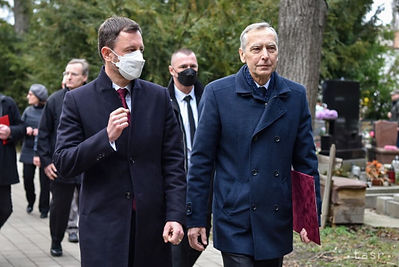
Na snímke zľava predseda vlády SR Eduard Heger, slovenský politik Ján Figeľ kráčajú na spomienkové stretnutie na Martinskom cintoríne v Bratislave 20. februára 2022.Foto: TASR – Pavol Zachar
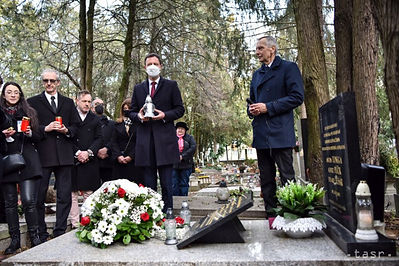
Na snímke sprava slovenský politik Ján Figeľ, predseda vlády SR Eduard Heger stoja počas spomienkového stretnutia pri hrobe martýrov Bielej légie, v Bratislave 20. februára 2022.Foto: TASR – Pavol Zachar
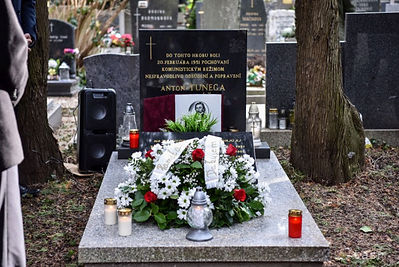
Na snímke hrob martýrov Bielej légie na Martinskom cintoríne v Bratislave 20. februára 2022.Foto: TASR – Pavol Zachar
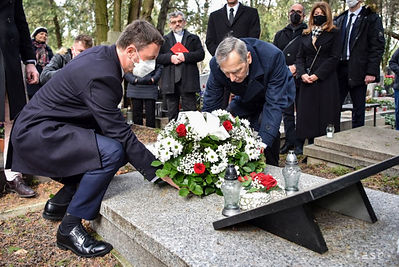
Na snímke zľava v popredí predseda vlády SR Eduard Heger, slovenský politik Ján Figeľ pokladajú veniec počas spomienkového stretnutia pri hrobe martýrov Bielej légie na Martinskom cintoríne v Bratislave 20. februára 2022.
Foto: TASR – Pavol Zachar
-
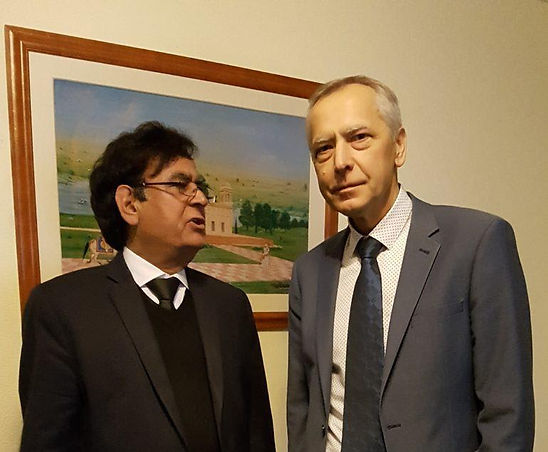
PAKISTAN: Jan Figel’s views on religious freedom
Former EU FoRB Special Envoy Jan Figel’s views on religious freedom
About blasphemy laws; violence against religious minorities; kidnapping, forced conversion and marriages of non-Muslim girls
By Willy Fautré, Human Rights Without Frontiers (HRWF)

Photo: EU FoRB Special Envoy Jan Figel with Asia Bibi’s lawyer Saif ul Malook in Lahore, Pakistan, December 2017.
HRWF (19.02.2022) – On the eve of the 8th Meeting of the Istanbul Process against religious intolerance, stigmatisation, discrimination, incitement to violence and violence against persons based on religion or belief hosted by Pakistan, EU Special Representative for Human Rights Eamon Gilmore delivered some welcoming remarks on behalf of the EU on the occasion of the 10th anniversary of Human Rights Council Resolution 16/18.
Human Rights Without Frontiers interviewed former EU Special Envoy Jan Figel to share his views about the situation of religious freedom in Pakistan as during his mandate he had vigorously and successfully stood up for the case of Asia Bibi, a Christian sentenced to death by hanging on alleged blasphemy charges. After years spent on the death row, she was acquitted in 2018 by the Supreme Court on the grounds of insufficient evidence. She now lives in Canada.
HRWF: Pakistan is a beneficiary of the GSP+ scheme, which grants a privileged access for its products to the EU market, but members of the European Parliament and civil society organizations in Europe are pressing Brussels to suspend this status due to egregious violations of human rights in Pakistan. What is their main area of concern?
Jan Figel: Pakistan has been benefitting from trade preferences under the GSP+ program since 2014. The overall economic incentives from this unilateral trade advantage for the country are considerable, reaching billions of Euros. But almost every year the European Parliament adopts a critical resolution or statement on various crimes, human rights violations or judicial abuses. The GSP+ status came with the obligation for Pakistan to ratify and implement 27 international conventions, including commitments to guarantee human rights and religious freedom. This is a frequent and vast problem in Pakistan. The latest GSP+ assessment of Pakistan in 2020 by the Commission expressed a variety of serious concerns on the human rights situation in the country, notably the lack of progress in limiting the scope and implementation of the death penalty.
One of the most striking issues has been the continued use of the blasphemy laws in Pakistan since 1986 after they were adopted by the former military regime. Regrettably, civilian governments have not had enough goodwill, or courage, afterwards to get rid of these stringent provisions that are frequently misused against a neighbor or an opponent to settle personal scores. Almost 1900 persons have been charged in total so far, with the highest numbers in recent years. In 2019 the UN Special Rapporteur on Freedom of Religion or Belief Ahmed Shaheed mentioned the case of Asia Bibi in his annual Report as one of the examples of a revival of anti-blasphemy and anti-apostasy laws and the use of public order laws to limit any expression deemed offensive to religious communities.
As a Special Envoy for the Promotion of Freedom of Religion or Belief outside the EU (2016-2019) I followed the case of Asia Bibi very closely and was involved with Pakistani authorities, repeatedly and intensively. The EU showed here its positive influence; it was an excellent example of effective diplomacy and soft power. Regrettably, this important effort has not been continued, there is no Special Envoy for FoRB outside the EU anymore. Obviously, FoRB is not a priority today as it was under Juncker´s Commission.
HRWF: To what extent are religious minorities victims of human rights violations and discrimination in Pakistan?
Jan Figel: Religious minorities face many types of social and religious discrimination. Such discrimination is also observed at the official level in state and public employment as well as in private sector jobs. Minorities are disliked, ignored and sidelined. Even in schools, children face such challenges. My Pakistani friends quite often tell me about their painful experience.
Discrimination of religious minorities became a usual, daily phenomenon in Pakistan, both officially and socially in the larger society. State condemnation of violence and discrimination of religious minorities especially against Hindus and Christians is, regrettably, only a lip service. We all know that slogans and hollow statements can never replace sincere commitments, continued efforts and justice for all. They are just meant to appease the international audience.
The most severe situation concerns Ahmadis, who claim their Islamic identity and belonging, but this is not recognized by the State. Members of this community are openly and constitutionally discriminated against and they are frequently attacked by violent mobs. The government repeatedly showed its impotence to protect religious minorities who are regularly harassed: mainly Christians, Hindus, Shias, Ahmadis and Sikhs.
HRWF: Can you give some examples of recent incidents targeting religious minorities?
Jan Figel: There are too many examples to share, unfortunately. Here are some of them. In 2020 Saleem Masih, a 22-year-old man in the city of Kasur, in Punjab province, was tortured to death by local landlords after they accused him of ‘polluting’ the water he bathed in. His only fault was that he was a Christian He was tortured to death for taking a dip in a village tube well in Pakistan.
Tabitha Gill, a Christian nurse in Karachi, was beaten in January 2021 by her Muslim colleagues who accused her of blasphemy.
Recently, Salma Tanveer, a Muslim woman and a mother of five children, was sentenced to death in September 2021 after spending nine years in prison.
Aneeqa Ateeq, a 26-year-old Muslim woman, was also sentenced to death in January 2022.
Some radical Muslims killed a Shia sect cleric Maulana Khan for alleged blasphemy in autumn 2020 in Karachi.
Blasphemy incidents affect Muslims and non-believers as well. It is critically high time to look closely at these issues and correct this whole unjust system.
A Sri Lankan factory manager was beaten to death and set ablaze by a mob over blasphemy accusations in Sialkot city, in Punjab, in December last.
Recently, in February, a crowd snatched a man accused of blasphemy at a police station in Khanewal, also in the Punjab Province. He was beaten and hanged. As journalist Waqar Gillani puts it, there is an unending tale of horror in Pakistan…
One must wonder where the rule of law is. On which side do the police stand?
Punjab Governor Salman Taseer was shot dead by an official bodyguard in 2011 because he criticized the blasphemy laws and demanded Asia Bibi to be pardoned. Shortly after Taseer was gunned down, Shabaz Bhatti, the Federal Minister for Minorities and the only Christian in the Cabinet, was shot dead.
Peace in society is the fruit of justice. Justice delayed is justice denied, I repeated during my missions to Pakistan in Islamabad, Karachi, Lahore and Ravalpindi. Justice needs more than labels, slogans or words – it needs action, decisions and perseverance.
HRWF: Is there some truth in the kidnapping and forced conversion stories of about 1000 Pakistani girls per year?
Jan Figel: Rights groups say that every year in Pakistan as many as 1,000 minority girls are forcibly converted to Islam, often after being abducted or tricked. According to Amarnath Motumal, the vice-chairperson of the Human Rights Commission of Pakistan, an estimated 20 or more Hindu girls are abducted and forcefully converted every month, although exact figures are impossible to gather.
In a shocking decision, the Lahore High Court has recently ruled in favor of a Muslim perpetrator who forcibly abducted, converted to Islam and married an underage Christian girl called Maria Shahbaz. The 14-year-old girl was abducted in Faisalabad in April 2020.
So, it is a majority Muslim dominance issue. The formal law does not allow marriage before 18 years. Such child conversions and marriages are therefore illegal. Recently, Pakistan has tried to pass a law against forced conversions but later the Government gave in to pressure of religious extremists and in September the bill was deferred. HRWF: Which laws in Pakistan are contrary to international agreements and should be urgently amended?
Jan Figel: Blasphemy laws are the single most draconian laws that undermine freedom of thought, religion or expression. It literally suffocates the religious minorities, instills deadly fear of mob violence and forces religious minorities into submission to the whims and authority of the majority.
Government efforts towards Islamization of Pakistan’s civil and criminal law, which began in the early 1980s, have dangerously undermined fundamental right to freedom of religion and expression, and have led to serious abuses against the country’s religious minorities. The broad and vague provisions of a series of laws known collectively as the “blasphemy” laws, which strengthen criminal penalties for offenses against Islam, have been used to bring politically motivated charges of blasphemy or other religious offenses against members of religious minorities as well as some Muslims.
The blasphemy laws have also contributed to a climate of religious bigotry which has led to discrimination, harassment and violent attacks on minorities – abuses which are apparently tolerated, if not condoned, by some political leaders and government officials.
HRWF: Our organization has a database of dozens of documented cases of Christian, Hindu, Ahmadi and even Muslim Pakistanis who are on the death row or have been sentenced to heavy prison terms or have been in pretrial detention for years on blasphemy charges. Does the judicial system work in conformity with international standards in this regard?
Jan Figel: In theory and on paper the judicial system may appear to work in conformity with international standards but in practice and reality on the ground it does not. The state influences action or inaction on any judicial process on matters of religious content in courts, keeping the political expediency at the forefront. This forces guilty verdicts or delayed verdicts in sensitive religious cases.
The most prominent example is the case of Asia Bibi. This woman from humble background was mercilessly beaten and charged with blasphemy for drinking water from a container used by her Muslim co-workers. She was sentenced to death by a lower court and subsequently by higher courts on appeal. However, when her case became known in international media, Pakistan found a way to release her after nine years of incarceration. The Supreme Court of Pakistan squashed the case on technical grounds but still did not declare her innocent. Asia Bibi had to flee from Pakistan to Canada under a hush deal between the two countries.
Quite often, the police also fail to protect vulnerable groups and individuals. This was the case on February 14, in Lahore, when 25-year old Pervez Masih was killed by a violent mob although the police had been informed and called for protection.
In Pakistan, the rule of law is weak and justice is delayed or not carried out because of the religious indoctrination of masses and street power. Quite often semi-illiterate religious clerics force the judicial system to bow down to their influences. The state security and law enforcing authorities are weak and also subject to some religious considerations. Due to this weakness, several courageous judges have been killed or had to flee the country.
The criminal justice system in Pakistan needs overhauling and courage in this context. It is flawed. There is a tacit support to the complainant’s side at all levels: police, prisons and courts. Amid fears, pressures and like-mindedness the judges try to shift the decision to higher and superior courts. Sometimes, their partiality is obvious, even in their judgments.
In a recent court ruling, the judge in Rawalpindi sentenced to the death penalty a Muslim woman accused of blasphemy, saying she was not only a blasphemer but also an apostate, for which she deserved the capital punishment.
So, there are few examples when the judicial system works in conformity with international standards. If it happens that is only at Supreme Court level, which is the highest level.
HRWF: To what extent does or doesn’t Pakistan promote religious tolerance in its school education system?
Jan Figel: The education system should do much more for interreligious and interethnic tolerance and coexistence. On the contrary, one can see instillation of hate against Hindus, in particular by misrepresenting and concocting the struggle for India’s independence from British colonial rule. The word Hindu for some groups represents an enemy of Pakistan and Islam.
There are positive efforts but a traditional mindset prevails in society. Discrimination and intolerance exist in the administration, and also among educators and teachers. Noteworthy is that the recent compulsory Single National Curriculum (SNC) also has a religious perspective; even in the English and science classes, religion has been introduced. The State has been defined as a religious one, the Islamic Republic of Pakistan, since the times of the military regime… There are fears that this SNC will increase intolerance and biases, and will have an adverse impact.
Good literacy for all and relevant education is needed for peace, coexistence and more promising development in Pakistan. But the content of education is a decisive factor! The state must take more of that and do its duty properly.
HRWF: The GSP+ has been the best attempt of the EU at being concrete and objective about the importance of international treaties in its relationships with third countries. Soon, DG Trade, the EEAS and several services within the Commission will evaluate to what extent Pakistan has been complying with the 27 international agreements that are conditions to receive and keep the “GSP+” status that is worth billions of Euro, greatly benefitting the economy of Pakistan. What is your view on this process?
Jan Figel: I agree that the GSP+ is a great EU instrument to bring important rules, values and sustainable development into beneficiary countries, including the largest one among them – Pakistan. Here it cannot be “business as usual”. The EEAS runs a big EU Delegation of diplomats and has some detailed knowledge of the reality on the ground. It is important for the Commission to have a fair assessment and recommendations in line with the agreed objectives of this Agreement, and for the European Parliament and the Council to adopt responsible positions. Only a Europe caring about justice can be a strong, constructive and respected global actor.
Twenty-seven international treaties that are the conditions to receive and keep the “GSP+” status should be not only signed and ratified by the Government and the Parliament of Pakistan. They must be implemented (!) in practice for the benefit of people. Those treaties cover human rights, the rule of law, environmental protection, labor law, the fight against corruption, etc.
To this end, Pakistan has created the TIC – Treaties Implementation Cell. Therefore, the EU should focus on the monitoring of the implementation. A lot of European taxpayers’ money is donated to Pakistan in support of these commitments. It is time for a fair and credible assessment. This would be the only effective tool of the EU to force Pakistan to review its symptomatic, visible injustice towards its religious minorities.
HRWF: Do you think that by ignoring the non-compliance with a number of international treaties the EU would really be helping Pakistan and that other unsuccessful candidates for the GSP+ status would not feel discriminated against by perceived EU’s double standards ?
Jan Figel: By unconditionally condoning Pakistan, the EU is sending an inconsistent, wrong message to the other candidate countries. The Union must have one credible face and refuse double standards. Pakistani authorities speak a lot about democracy and protection of minorities. They have a ministry for human rights but there are many fresh blood stains on the white strip of Pakistan’s flag. The inspirational founding father of Pakistan, Ali Jinnah, needs followers in deeds, not in words.
HRWF: Considering Pakistan’s neighborhood and Europe’s interests, do you think it is justified to let Pakistan off the hook on human rights issues, because of the situation in Afghanistan and its influence in Pakistan?
Jan Figel: Pakistan is an important EU partner and a nuclear power but which country is not important in this region? If for this reason we let Pakistan continue to implement the same policies, it will only encourage it to play its geopolitical and geostrategic card. Status quo is not enough for the betterment of lives and relations within the country. Pakistan must be held accountable for its actions and its commitments. This is the best service the EU can provide to people of good will in Pakistan.
HRWF: What should Eamon Gilmore, the EU’s Special Representative for Human Rights, tell the Pakistani authorities when visiting Pakistan later this month?
Jan Figel: The EU Special Representative should ask the Government of Imran Khan to address the issue of the draconian blasphemy laws. I would recommend him to talk about the fairness of the administrative, legal and judicial systems dealing with, investigating and taking decisions about blasphemy cases. There must be a fair and impartial way of treating such cases. The Government also should think of a consensual mechanism to deal with the growing number of blasphemy cases, especially under the cybercrime legislation.
Eamon Gilmore was supportive of FoRB promotion and we had some very constructive cooperation during my mandate as EU FoRB Special Envoy. He may encourage the authorities of Pakistan to adopt effective and transparent laws, programs and actions to improve the situation of economically and socially marginalized religious minorities. The members of these communities are frequently relegated to the lowest and unhygienic waste cleaning jobs while they should given equal employment opportunities to show their talents.
As a former EU Commissioner for Education, Culture and Youth I would strongly recommend to the EU Commission to offer active cooperation and creative professional review of Pakistan’s new “One Curriculum” schoolbooks for the promotion of religious tolerance.
Without a necessary and credible review, the Single National Curriculum may increase hatred, discrimination and prejudices and may also lead to the misuse of blasphemy cases. Good and accessible education unites people and builds bridges among nations as well. Education is important for future of Pakistan both internally and externally.
Further reading about FORB in Pakistan on HRWF website
-

Odkaz chlapcov z Bielej légie
https://www.facebook.com/NadaciaTunega/videos/321645793319649/?ref=embed_video&t=0
Práve dnes pred 71 rokmi, 20. februára 1951, boli v Bratislave v Justičnom paláci popravení obesením traja mladí ľudia – Albert Púčik, Anton Tunega a Eduard Tesár. Dnes sme si ich pripomenuli na spomienkovom stretnutí pri hrobe martýrov Bielej légie na Martinskom cintoríne v Bratislave.

Podobizne zľava: Anton Tunega, Albert Púčik, Eduard Tesár. Foto: Matúš Zajac
Jeden z odkazov, ktorý ma vždy napadne pri spomienke na Bielu légiu, je tento:. Len ak sa matka, otec, vychovávateľ, starosta, štátnik obetujú pre dobro detí či zverených osôb, pripravujú im lepšiu budúcnosť. V opačnom prípade ide len o administrovanie podmienok života, v horšom prípade o konzumáciu budúcnosti. Pravda o obetiach a výzva k obetavosti sú nepopulárne, a často opomínané. Veď dnešný marketingový svet ponúka rýchle a bezohľadné úspechy, má väčší zmysel pre percepciu, pocit a zdanie než pre fakty, realitu a trpezlivé, poctivé úsilie. Funguje to len zdanlivo a dočasne. Pravda nás dobieha, pretože je silnejšia.
20. februára 1951 boli v Bratislave v Justičnom paláci popravení obesením traja mladí ľudia – Albert Púčik, Anton Tunega a Eduard Tesár. Prvý bol študentom medicíny, druhý techniky a tretí študoval právo. Nemali ani 30 rokov, keď boli odstrašujúco zbavení života ako lídri protikomunistického hnutia Biela légia. Slovensko po II. svetovej vojne nevítalo komunizmus s potleskom. Vo voľbách v r. 1946 vysoko zvíťazila Demokratická strana. Komunisti však postupne ovládli silové zložky nielen v Čechách, ale aj na Slovensku a po mocenskom puči v tzv. Víťaznom februári 1948 ovládli celý štát. Československo sa na vyše 40 rokov zaradilo do sovietskeho bloku a na svojich západných hraniciach vystavalo ako v obrovskej väznici železnú oponu.
Tunega, Púčik a Tesár patrili k mladej slovenskej generácii, ktorá si uchovala kresťanské a národné ideály a túžila ich rozvíjať v demokratickom duchu. Nemali mocenské prostriedky, ale mali odvahu vzoprieť sa nastupujúcemu totalitnému režimu vo forme nenásilného hnutia.
Pomáhali šíriť informácie o nebezpečenstve komunizmu, pomáhali utečencom pri prechode hraníc, dodávali informácie rozhlasovej stanici Biela légia, ktorá vysielala v slovenčine z Rakúska. Bola to predchodkyňa neskoršieho rádia Slobodná Európa. Na rakúskom území tiež spolupracovali s americkou službou CIC (Counterintelligence Corps), predchodkyňou CIA. Biela légia bolo rozsiahle hnutie, ktoré pôsobilo v r. 1947 až 1955, s ideovým presahom do 60-tych rokov. Bolo dlhodobo a tvrdo prenasledované komunistickou mocou. Vrcholom represie bol politický monsterproces v r. 1949-50, jeden z najrozsiahlejších v ČSR. V jeho finále bolo 62 obvinených, 48 odsúdených a traja popravení. V rámci potláčania hnutia však útoky a fyzická likvidácia jeho spolupracovníkov pokračovali systematicky a dlhodobo po celom území Slovenska.
Traja mučeníci našej slobody boli súdne rehabilitovaní v r. 1990. Trvalo 30 dlhých rokov, kým ich postoje a obeta boli štátnou mocou prvýkrát aj ocenené. Vďaka za to patrí parlamentu. V septembri minulého roku predseda NR SR udelil „predstaviteľom Bielej légie osobitne Antonovi Tunegovi, Albertovi Púčikovi a Eduardovi Tesárovi Štátnu cenu Jozefa Miloslava Hurbana in memoriam za ich mimoriadne významné zásluhy … v oblasti rozvoja demokracie v Slovenskej republike“. Po dlhých rokoch ich obeta je tak nielen faktom našich dejín, ale aj s úctou uznanou významnou súčasťou zápasu o našu slobodu a demokraciu.
Od r. 2020 je v Kancelárii prezidentky republiky návrh na štátne vyznamenanie, keďže doteraz žiadna z hláv našej republiky k takémuto rozhodnutiu iniciatívne nepristúpila. Nadišiel čas. Primátor a poslanci Bratislavy dostali pri 70. výročí popravy návrh na umiestnenie pamätného súsošia martýrov Bielej légie na Námestí slobody v Bratislave. Hrdinovia nemajú byť národu neznámi, nesmú byť zabudnutí. A sloboda neprišla samočinne, ani anonymne. Nezaslúžili sa o ňu len vojaci, ale aj civili, občania, statoční ľudia. Na Námestí slobody pri Úrade vlády SR v Bratislave DOTERAZ namiesto hrdinov stojí socha komunistického pohlavára Mareka Čulena, ktorý bol v čase likvidácie Bielej légie na vrchole politickej moci. Na to niet ospravedlňujúcich slov. Proste, na Slovensku je to tak… Namiesto jednoznačných postojov k pravde a faktom tu mnohých zodpovedných ľudí vyrušujú hoaxy a dezinformácie. O čo menej je vernosti pravde, o to viac je priestoru pre manipulácie.
Budúcnosť sa rodí cez obetu. Naša slobodná súčasnosť sa takto rodila v zápase o dôstojný život. Kto si to pamätá, ten spolu s pamäťou nesie aj úctu a vďaku za obete. Ak máme v sebe úctu a vďaku voči hrdinom a zaslúžilým, budeme mať aj zodpovedné konanie, aby sme o dar slobody a demokracie postupne neprišli.
https://dennikstandard.sk/171114/odkaz-chlapcov-z-bielej-legie

